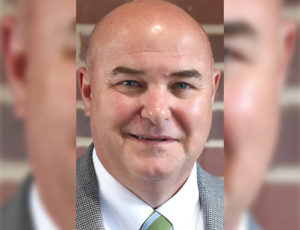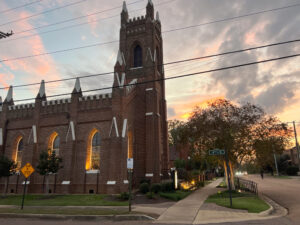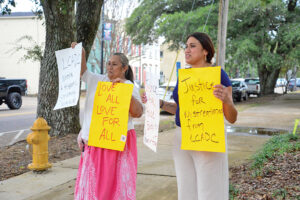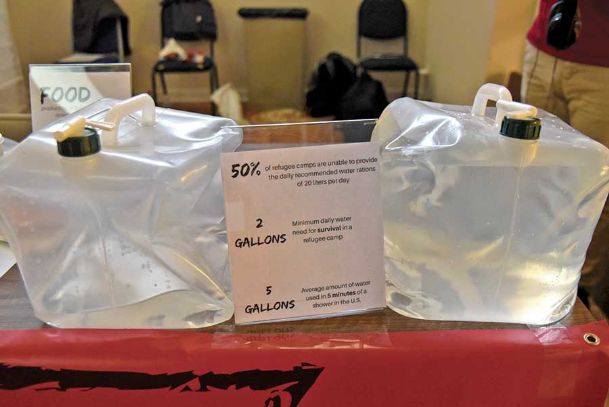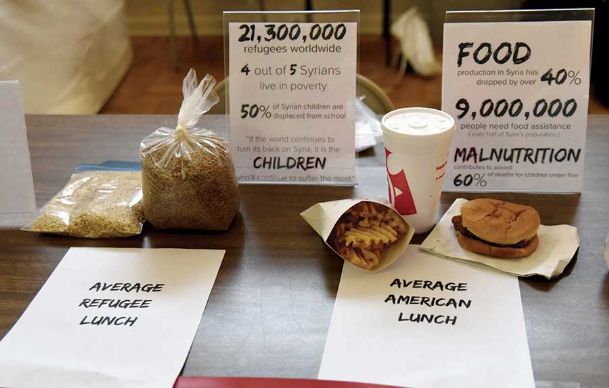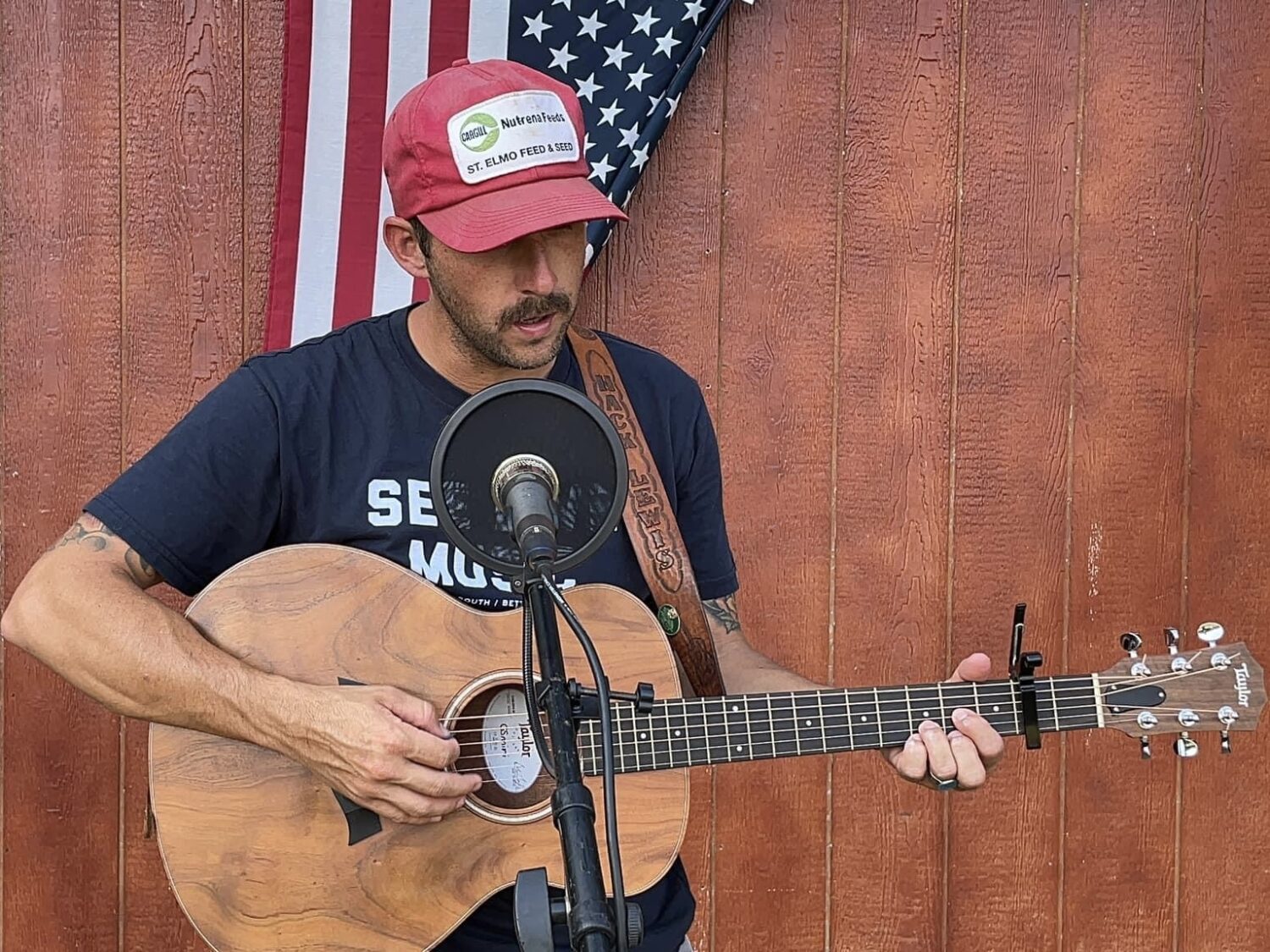It took only a few minutes for Mississippi School for Mathematics and Science students Stephanie Dauber, Alexander Whitwam and Kennedy LaPort to view the exhibit on the second floor of the Mississippi University for Women Student Center Wednesday.
But a few minutes spent observing a replica of the living conditions of approximately 13.5 million Syrian refugees made a big impression.
“I didn’t realize things were still this bad,” said LaPort, a senior from Southaven. “… I thought they had gotten everything back together and everything was orderly.”
Whitwam, a senior from Columbus, was only a little more aware.
“I was kind of aware it was still a problem,” he said. “… I guess this just brought it back to the forefront and made me more aware of the scope of the issue.”
Wednesday’s exhibition was the work of the Mississippi State chapter of a national organization supported by the U.S. State Department. The MSU chapter is one of 52 chapters located throughout the country and the only one in Mississippi. The group’s mission is to support the work of the State Department’s working group in Amman, Jordan, to support Syrian children in refugee camps.
“The name ‘No Lost Generation’ explains that we work to make sure there isn’t a lost generation of Syrian youth, like in Sudan and in many other refugee crises we’ve seen,” said chapter president Laura Herring, a senior international business major from Panama City, Florida.
For three hours Wednesday, MSMS and MUW students toured the exhibit, which included a small tent furnished with items typical for the 65 million refugees throughout the world — a few sticks of firewood for heating and cooking, a kerosene lamp for light and crude pallets on the bare floor. No running water, no sewer system, no electricity.
What was meant to be short-term housing has become a permanent reality, Herring said.
“Refugees can stay in these camps anywhere from five to 24 years, according to the data,” she said. “A third of the refugees are children. They’ll never have access to education. That’s what this group focuses on.”
A ‘human story’
One of the primary goals of No Lost Generation is to raise awareness. The refugee crisis has faded into the background, yet the human suffering continues for millions.
Herring was vaguely aware of the refugee crisis, but the full force of the human suffering did not hit her until last year, when she spent a summer in Turin, Italy working with refugees from sub-Saharan Africa and the Middle East.
“When you come up against that in a one-on-one way, when you hear their stories, see the wounds they carry, the impact it has on children, you really become more aware of what it means,” she said. “It’s the human story, not the statistics.”
The human suffering was something Wednesday’s exhibit drove home effectively, if students’ reactions were any indicator.
“The fact that one-third of these refugees are children is heartbreaking considering what a life of luxury we live compared to them,” Dauber said.
“It really shocked me to see the size of the tent and to think that six or eight people have to live in a space so small for an extensive period of time,” Whitwam said. “That must really be psychologically tough. I can’t imagine anyone having to live like that.”
The grim exhibit left the students disturbed and also a bit overwhelmed.
“What can I do, other than maybe donate?” Dauber said.
Herring, herself, is the best example of what one person can do.
After returning from Italy, Herring was determined to raise awareness of the problem.
“There were more than 100 student organizations on campus,” she said. “But there wasn’t a single one devoted to migrants, immigrants or refugees. Personally, I think college and high school students are the largest population with the time and energy to dedicate to a cause like this. It disturbed me that no one in our state seemed to be talking about this. So I decided to organize a No Generation Lost chapter at Mississippi State.”
Compassionate responses
The chapter has about 40 members since it was started a year go. Its first refugee camp exhibit was presented at MSU’s International Fiesta in the spring. Herring said the traveling exhibit will continue, with plans to take it to the Ole Miss campus next year.
While the exhibit has only been staged twice now, the reaction has been encouraging to Herring.
“We didn’t know how it would be received,” she admitted. “We don’t have any resettled refugees in our state. It’s something our state government does not support. The biggest thing we wanted to do, especially with young people, was to introduce them to the topic and help them create more compassionate responses.
“I grew up in a military family and I very much support the work of the State Department and what they do to secure borders in the U.S. But I also support accepting refugees,” she added. “I don’t think you have to dispel one to accept the other.”
LaPort agreed.
“It’s completely silly,” she said. “There’s no added risk, like some people say. So many of them are children. It just seems cruel to deny them an education or a chance to live in a safe environment with food and water.”
Slim Smith is a columnist and feature writer for The Dispatch. His email address is [email protected].
You can help your community
Quality, in-depth journalism is essential to a healthy community. The Dispatch brings you the most complete reporting and insightful commentary in the Golden Triangle, but we need your help to continue our efforts. In the past week, our reporters have posted 46 articles to cdispatch.com. Please consider subscribing to our website for only $2.30 per week to help support local journalism and our community.


